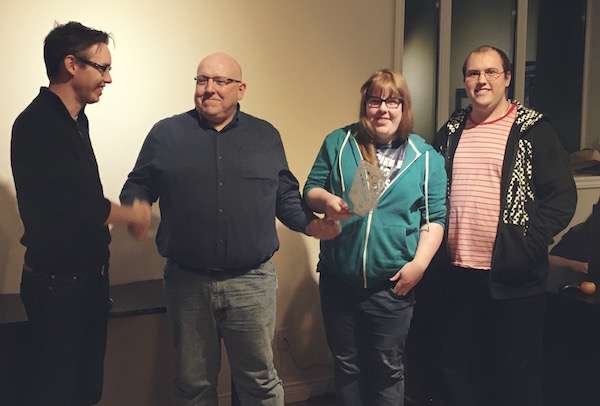
This year’s event had a ton of potential, with many pre-registered participants and some fantastic ideas right out of the gate. Expectations were high and the participants did not disappoint.
With some incredible sponsorship participation (from folks like Annette Verschuren, Protocase, CB Partnership, NSBI, UIT Startup Immersion, Doktor Luke’s Coffee Shop, and Breton Brewing), Marcato was able to distribute multiple prizes and awards throughout the weekend. However, what all participants really wanted to win was one of the top three grand prizes.
This year’s third-place award went to Matthew Butler, of Glace Bay, who developed presentation software that allowed participants of a lecture-type-meeting to easily follow along with their lecturer’s PowerPoint-type presentation on their own personal laptop or mobile device, in real time. This application could be extremely useful in many scenarios. For example, in a large university class, students sitting far away from the presentation screen would have a much easier time viewing the presentation from their own mobile device versus a screen that’s maybe 40 feet away from them. This app would allow them to do that with ease.
The second-place grand prize was awarded to a team of two (Rachael MacKeigan and Allyson White) who developed a uniquely Cape Breton app called “Heavy Garbage Tinder” (which was a play on the popular dating app Tinder). However, instead of casually swiping through pictures of potential dates, the heavy garbage app would allow users to swipe through hundreds of already uploaded heavy-garbage pictures and then notify the owners if they were going to claim a certain piece of their trash as a treasure. It’s an environmentally friendly idea and certainly Cape Breton approved.
Finally, the first-place prize was given to a team of three (Corey Musgrave, Bob White, Ardell MacKinnon) who developed an app called “Lemon-Aide”, which smartly pulled pre-existing vehicle-recall information from a government website and re-presented it in an easy-to-read and easy-to-navigate format. In this winning app, one could enter their vehicle’s make, model, and year to view any recall information that had been historically published about their vehicle. Users could also request notifications be sent to them, via text or email, if any recall information was published about their car in the future.
Most of the projects started during the hackathon were not ready-for-market by the time the event was over, and some of the apps won’t ever reach that stage. However, that’s not really the point of a hackathon.
“What hackathons are meant to do is illuminate and cultivate the incredible innovation and creativity that’s within our local tech community,” says Marcato co-founder and Chief Technical Officer, Morgan Currie. “Marcato is proud to play a part in that cultivation and celebration of Cape Breton innovation and we’re very grateful to have had many others join us this year in the task.”

